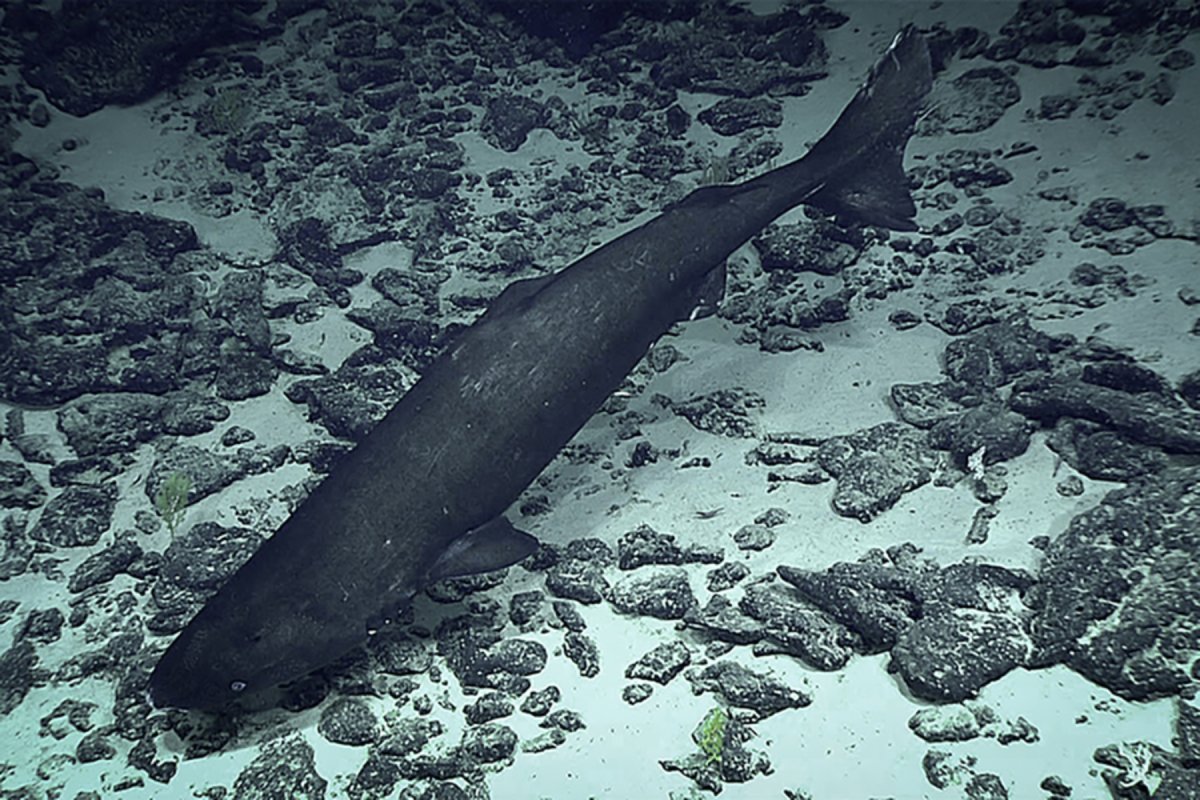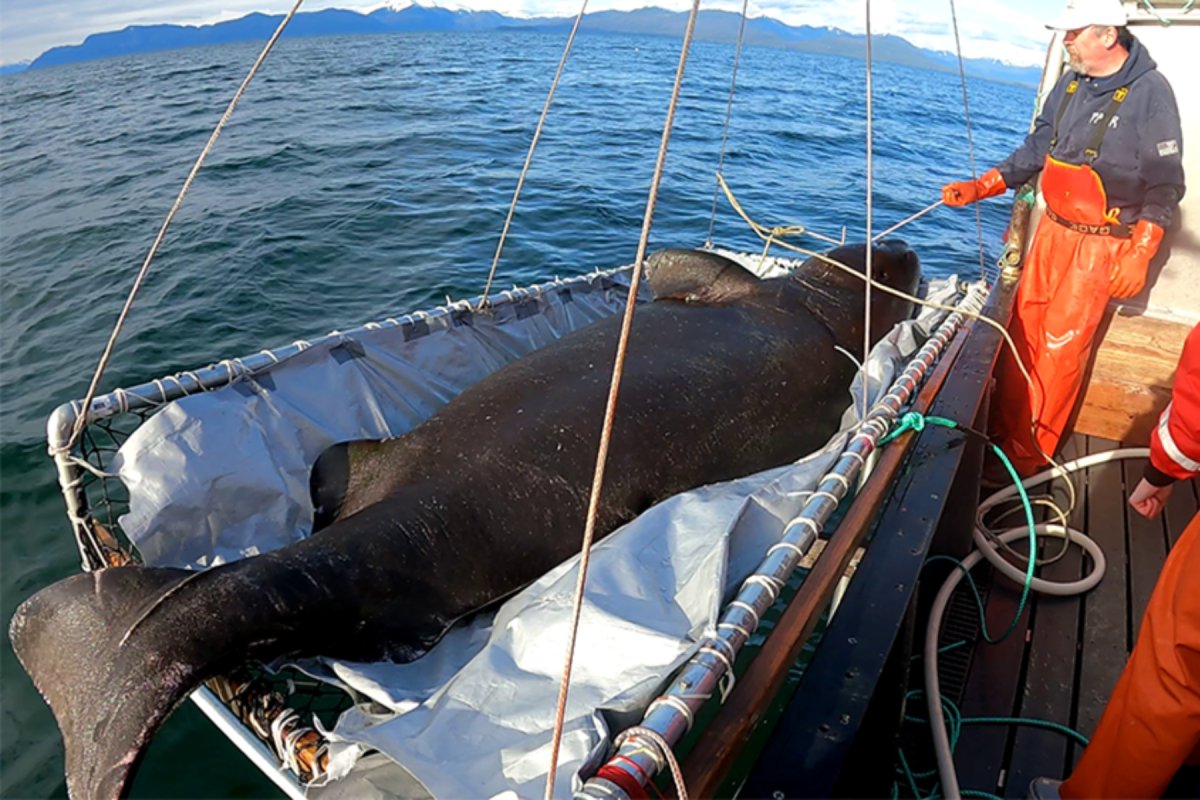National Oceanic and Atmospheric Administration (NOAA) researchers have unpicked some of the mysteries surrounding the biology and life cycle of the rare and elusive sleeper shark.
Pacific sleeper sharks live in the depths of the ocean, spending most of their time as deep as 6,600 feet below the surface, and are thought to be some of the longest-lived animals in the world.
Scientists know very little about these strange creatures, except that they are heavily threatened by overfishing, according to a new NOAA Fisheries study in the journal Polar Biology.

"We still know little about even its most basic biology," Beth Matta, a research fisheries biologist at the NOAA Fisheries Alaska Fisheries Science Center, said in a statement.
"We can't manage what we don't understand," Matta said. "We wanted to create a one-stop shop for information on Pacific sleeper sharks—a resource that others can use."
Pacific sleeper sharks can grow to lengths of up to 23 feet, and are extremely slow-moving deep-sea dwellers. They can live for an incredibly long time, possibly several centuries, and grow very slowly, taking decades to reach sexual maturity.
They have very few offspring during their long lives, meaning that they are vulnerable to population decline if overfished. They are rarely seen by humans except as accidental fishing bycatch, and these are often juveniles.
"Sustainable fishing rates for long-lived sharks are very low. For example, the spiny dogfish, a Pacific sleeper shark relative with a lifespan of 100 years, can tolerate harvest rates of only about 3 percent," study co-author Cindy Tribuzio, a researcher at the NOAA Fisheries Alaska Fisheries Science Center, said in the statement. "Pacific sleeper sharks potentially take that to extremes."
Despite its significant size, extensive habitat range, and vulnerability, the Pacific sleeper shark has only recently been the subject of research. This lack of study primarily stems from its minimal commercial importance, hard-to-reach living environments, and the challenges associated with safely capturing and managing these large sharks on ships.
"A large portion of the population remains unseen and unsampled," Tribuzio said.
In the paper, the researchers describe how they found that numbers of Pacific sleeper shark observations have declined off Taiwan and Alaska, but have risen in Russian waters. Additionally, genetic data showed that rather than there being three different species of Pacific sleeper shark, all the specimens in the Pacific are likely from a single type.
"We used to think there were three large species in the genus: Pacific sleeper shark, southern sleeper shark, and Greenland shark," Matta said. "Now we know the southern sleeper shark is not genetically distinct."
They also found that there is likely a very important habitat in the Bering Sea where the sharks grow to adulthood. The researchers were additionally able to study a 14-foot female shark that was caught in the summer of 2023, which was found to be at least 35 years old, but still sexually immature.
"That indicates not only extreme longevity, but also delayed maturity," Tribuzio said. "All those pieces together suggest a high susceptibility to becoming overfished."

The Polar Biology paper is a compilation of knowledge about this shark from a vast range of sources, with the researchers hoping to use the information to better understand the risks to the species and how they can be managed.
"We don't have a lot to go on for managing this species. Right now they are managed based on historical catch. That's not ideal, especially for a highly vulnerable species," Tribuzio said. "The more information we can gather, the better we can develop and apply alternative methods that will do a better job of assessing this and other data-limited species."
The researchers scoured existing literature about the species, using data gathered by the Alaska Fisheries Science Center, and Fisheries and Oceans Canada.
"Almost all the research we have done and are doing is highly collaborative. We especially work with fishing industry partners a lot," Tribuzio said. "A lot of our research could not have been accomplished without their support and the measurements and samples they collect."
The researchers hope to use this new information about the species to prove that Pacific sleeper sharks are in dire need of conservation efforts.
"With the information we compiled in this study, we were able to demonstrate the need to prioritize Pacific sleeper shark assessment efforts," Tribuzio said. "And that we need to think out of the box on how to manage this species, given its vulnerability and challenges to assessing it."
"The more we learn about these sharks, the more we care about keeping them around into the future," Matta agreed. "And there is so much more to learn."
Do you have a tip on a science story that Newsweek should be covering? Do you have a question about Pacific sleeper sharks? Let us know via science@newsweek.com.
Uncommon Knowledge
Newsweek is committed to challenging conventional wisdom and finding connections in the search for common ground.
Newsweek is committed to challenging conventional wisdom and finding connections in the search for common ground.
About the writer
Jess Thomson is a Newsweek Science Reporter based in London UK. Her focus is reporting on science, technology and healthcare. ... Read more
To read how Newsweek uses AI as a newsroom tool, Click here.








